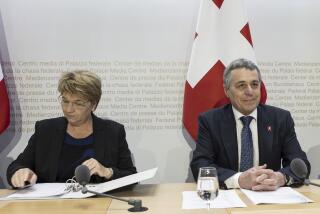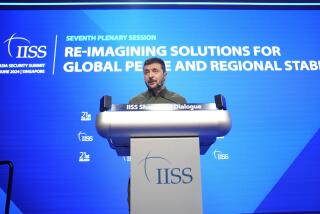Will Syria give peace a chance?
Given the failure of previous efforts to find a diplomatic solution to Syriaâs civil war, it might seem the height of naivete for the United States to join Russia â the protector and arms supplier of President Bashar Assad â in trying to arrange an international peace conference. But, given the alternatives, the Obama administration is right to pursue that possibility and to press Syrian opposition groups to participate, even without a guarantee that Assad would step aside.
Prospects for the proposed conference in Geneva, already uncertain, worsened Thursday when opposition leaders said they wouldnât send representatives until Iranian and Hezbollah fighters left the country and âmassacresâ stopped. Earlier, the opposition had reiterated that Assad must step down. Meanwhile, the Syrian president said that Russia was honoring its promise to supply his country with weapons (though U.S. and Israeli intelligence officials are skeptical that sophisticated antiaircraft missiles actually have been delivered). The conference, which was to have been held in June, is now expected to take place in July â if it occurs at all.
Yet despite these obstacles, a conference might prove useful. Increasingly the Syrian conflict is involving other actors in the region â not just Hezbollah, the Islamist militia that wields political power in Lebanon, but also Iran and Israel. Early this month Israel dropped bombs in Syria on what it said were weapons shipments headed for Hezbollah, and on Thursday Assad warned that he would respond to any future attacks. Meanwhile, refugees fleeing the fighting are straining the hospitality of Turkey, Jordan and Lebanon.
The alternative to the diplomatic process is military intervention by the United States and its allies. But the Obama administration (rightly, in our view) has been cautious, resisting proposals by Sen. John McCain and others for a no-fly zone and providing only nonlethal assistance to Syrian rebels. Britain and France succeeded in preventing the European Union from extending an arms embargo on military aid to the rebels, but neither country has moved to arm the opposition. Lifting the embargo seemed designed to put pressure on Assad to negotiate with his opponents.
On Thursday, Assad said he had decided âin principleâ to send negotiators to Geneva, and his government said he would stay in office at least until next year. But itâs possible to imagine a peace agreement in which Assad would retain his title while surrendering all or much of his power and perhaps promising not to seek another term. Whether Russia would support such a compromise is unclear; obviously it has protected the Syrian leader, but at times it has shown impatience with him.
There is no guarantee that an international conference will produce the result that the U.S. long has supported: a peaceful, post-Assad Syria not fractured along sectarian lines. But the administration is right to make the effort.
More to Read
A cure for the common opinion
Get thought-provoking perspectives with our weekly newsletter.
You may occasionally receive promotional content from the Los Angeles Times.










